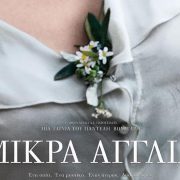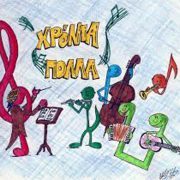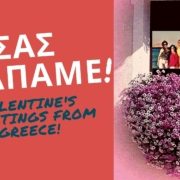If you’re learning Greek and love Greek music, the film Eftihia is a must-see! This moving biopic offers a unique opportunity to discover the life and legacy of one of Greece’s most influential female lyricists, Eftihia Papagiannopoulou. Watching this film is not only a great way to enjoy Greek cinema but also to deepen your understanding of Greek culture and enrich your vocabulary.
Who Was Eftihia Papagiannopoulou?
Eftihia Papagiannopoulou (1893–1972) was one of the most important female figures in the Greek music scene. She wrote lyrics for hundreds of laika and rebetika songs, many of which remain popular today and are still performed in tavernas, concerts, and festivals all over Greece.
She was born in Aydin, near Smyrna (modern-day Izmir) in Asia Minor, and fled to Greece after the destruction of Smyrna in 1922. Arriving in Athens with her two daughters, she would eventually become a beloved, though often underrecognized, figure in Greek music history.
She wrote the lyrics to many popular rembetika songs, working together with many well-known composers of her time like However, her significant contribution to Greek music was not recognized until her death in 1972.
A Lyricist Behind the Scenes
Although Eftihia collaborated with iconic composers such as Vassilis Tsitsanis, Apostolos Kaldaras and Manos Hadjidakis, her name often didn’t appear in official credits. Why? Because she frequently sold her lyrics outright—signing away any rights for immediate payment. This was partly due to her love of gambling, especially playing cards, and a need for quick cash.
In her own words (interview with Akropolis newspaper):
“I write songs and I sell them. From that point onwards, I do not care whether they will be a hit or not. When I submit them, I sign a form to renounce any rights to royalties—let’s say I ‘disown’ my brainchildren.”
Despite this, her songs became timeless classics.
Some of Her Most Beloved Songs
-
Ta kavourakia (The little crabs)
-
Dio portes echi i zoi (Life has two doors)
-
Ime aetos horis ftera (I am an eagle without wings)
-
An mou spasoun to bouzouki (If they break my bouzouki)
-
Ise i zoi mou (You are my life)
-
Oniro apatilo (Deceptive dream)
…and many more.
Her Life in Books and Theatre
Eftihia’s granddaughter, Rea Maneli, wrote a touching biography titled Η γιαγιά μου η Ευτυχία (My Grandma Eftihia), which offered personal insight into the lyricist’s unconventional life. The book was also adapted into a one-woman theatre performance by the renowned actress Nena Mendi.
The Movie Eftihia
In 2019, her extraordinary life was brought to the big screen in the film Eftihia, directed by Angelos Frantzis.
The role of Eftihia is played by two outstanding actresses—Katia Goulioni (young Eftihia) and Karyofyllia Karabeti (older Eftihia). The film also stars:
-
Pygmalion Dadakaridis as her second husband Yorgos Papagiannopoulos
-
Thanos Tokakis as Loukas, her close friend
-
Ntina Michailidou as Eftihia’s mother
The soundtrack, composed by Minos Matsas, brings her lyrics to life with a rich emotional backdrop.
Trailer
Click here to watch the trailer!
We hope you’ll have the chance to watch this movie, maybe even during an intensive Greek course with Omilo,
or at an outdoor summer cinema in Greece!
++++++++++++++++++++++++++++++
Want to Learn More About Greek Music?
Learning Greek through music is fun and effective!
You’ll improve your listening skills, expand your vocabulary, and connect with Greek culture and history.
At Omilo, we offer various eBooks that can help you do just that!
Order now and take advantage at 50% discount for this summer!
Greek Laika Songs eBook
 Laiko music, meaning “people’s music,” became widely popular in the 1950s–60s and is closely tied to the bouzouki.
Laiko music, meaning “people’s music,” became widely popular in the 1950s–60s and is closely tied to the bouzouki.
The eBook includes:
-
A short history of Laiko music
-
Musical instruments and major figures
-
6 translated songs with vocabulary exercises
-
Audio links & answer key
Printable eBook, PDF format, 29 pages (A4)
Greek Rebetiko Songs eBook
 Rebetiko is the soulful “Greek blues” of the early 20th century, capturing the struggles and passions of ordinary life.
Rebetiko is the soulful “Greek blues” of the early 20th century, capturing the struggles and passions of ordinary life.
The eBook includes:
-
History of Rebetiko music
-
Key composers & instruments
-
6 translated songs with listening and vocabulary exercises
-
Audio links & answer key
Printable eBook, PDF format, 24 pages (A4)
Entechna Songs – Learn Greek Through Poetic Music
 Improve your Greek vocabulary through the powerful and poetic world of Entechna music! This unique genre emerged in the 1960s, blending orchestral arrangements with Greek poetry—made popular by legendary composers Mikis Theodorakis and Manos Hatzidakis.
Improve your Greek vocabulary through the powerful and poetic world of Entechna music! This unique genre emerged in the 1960s, blending orchestral arrangements with Greek poetry—made popular by legendary composers Mikis Theodorakis and Manos Hatzidakis.
With our two Entechna eBooks, you’ll discover iconic songs, learn more about influential composers, lyricists, and singers, and boost your Greek with engaging exercises (with answer keys included). Each song comes with English translations and YouTube links so you can follow along.
Entechna Part 1 – Focus on Theodorakis & Hatzidakis (29 pages)
Entechna Part 2 – Expanding to other composers & artists (40 pages)
Enjoy this beautiful music and sing along while learning Greek!
Printable eBooks, 1 + 1 free, PDF format,
Whether you’re studying Greek with Omilo or exploring on your own,
Eftihia’s story and music are the perfect companions on your language journey!









